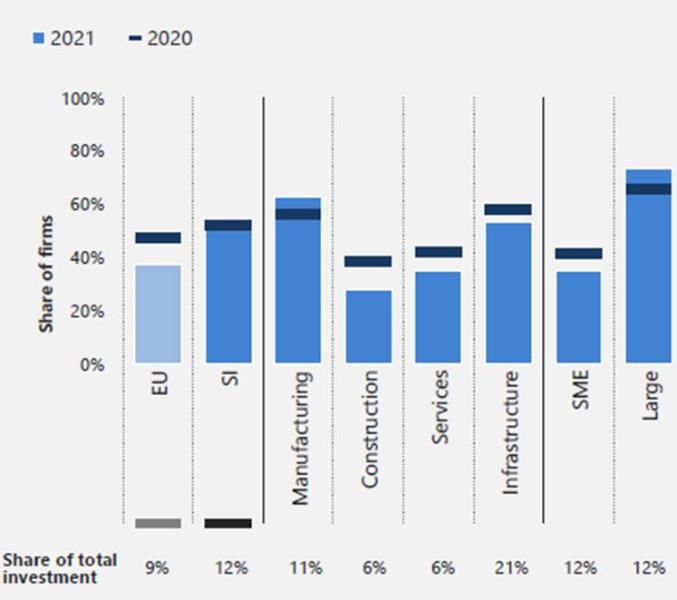
- The European Investment Bank and Bank of Slovenia today hosted a hybrid conference entitled “Towards the green transition: Investment and prices.”
- The EIB presented the results of the annual investment survey for Europe and Slovenia.
- The war in Ukraine has changed the EU macroeconomic landscape, creating major economic challenges.
- Slovenian firms remain committed to the green transformation, but many perceive it as a challenge.
- 52% of Slovenian firms invested in energy efficiency but climate investments lag behind EU peers.
The European Investment Bank (EIB) and the Bank of Slovenia today discussed the investment dynamics and impact of the climate transition on Slovenian enterprises at a conference at the Bank of Slovenia’s headquarters in Ljubljana.
Boštjan Vasle, Governor of the Bank of Slovenia, together with EIB Vice-President Ricardo Mourinho Félix, opened the event. EIB Chief Economist Debora Revoltella presented the results of the EIB Investment Survey (EIBIS) and discussed the current warning of economic slowdown in the European Union in an environment of higher inflation.
A panel on the impact of the green transition on investments and prices moderated by Simon Savšek, head of the EIB Group Ljubljana office, followed. Vice Governor of the Slovenian central bank Tina Žumer, Damjan Kozamernik, Executive Director of SID Bank, and Maureen Schuller, Head of Financials Sector Strategy at ING, joined the panel debate.
The 2021 investment survey highlighted that a quarter (26%) of Slovenian firms have already invested in measures to tackle climate change, while 40% of them have plans to invest more in the next three years. These figures are both below the EU average. Nevertheless, preliminary 2022 EIBIS data on climate investment is more encouraging. Furthermore, about half (52%) of Slovenia’s firms invested in measures to improve energy efficiency in 2020, which is above the EU average.
There is evidence that digitalisation has advanced in response to the pandemic. The survey finds that during the pandemic, 44% of Slovenian enterprises introduced new processes, services or products in their businesses. Three-quarters of them have implemented new advanced digital technology, exceeding the EU average by 14 percentage points.
Uncertainty about the future and lack of skilled staff remain the most cited barriers to investment for about 80% of enterprises according to the survey. High energy costs are progressively worrying Slovenian companies.
“It is encouraging to see that Slovenian firms have placed energy efficiency and digital technologies at the top of their agenda in the last two years. As the EU climate bank, we stand ready as a trusted partner to support Slovenian firms in the climate and digital transition,” said EIB Vice-President Ricardo Murinho Félix.
“The short-term energy security challenge combined with the long-term need for energy transformation requires substantial investment. Implementing further green-oriented policies to ensure investment is crucial to have an economic perspective that reflects firms’ ambitions and to further unlock private investments. It is key to protecting public investment, improving policy clarity and risk sharing,” said EIB Chief Economist Debora Revoltella.
The survey is part of the annual EIB Group Survey on Investment and Investment Finance (EIBIS), an EU-wide survey of 13 500 firms that gathers quantitative information on the investment activities of both SMEs and larger corporates, their financing requirements and the difficulties they face. EIBIS is developed and managed by the Economics Department of the European Investment Bank, with support for development and implementation provided by Ipsos MORI.
About the Economics Department of the EIB
The EIB Economics Department provides economic research and studies, as well as unique analyses of investment activities in the European Union and beyond. It supports the Bank in its operations and in the definition of its positioning, strategy and policy. Chief Economist Debora Revoltella heads the department, a team of 40 economists.